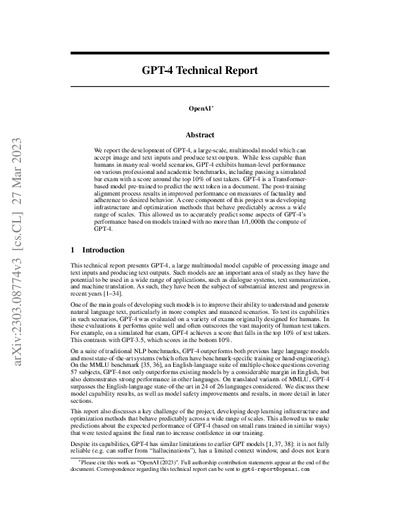 Zusammenfassungen
Zusammenfassungen
We report the development of GPT-4, a large-scale, multimodal model which can
accept image and text inputs and produce text outputs. While less capable than
humans in many real-world scenarios, GPT-4 exhibits human-level performance
on various professional and academic benchmarks, including passing a simulated
bar exam with a score around the top 10% of test takers. GPT-4 is a Transformerbased model pre-trained to predict the next token in a document. The post-training
alignment process results in improved performance on measures of factuality and
adherence to desired behavior. A core component of this project was developing
infrastructure and optimization methods that behave predictably across a wide
range of scales. This allowed us to accurately predict some aspects of GPT-4’s
performance based on models trained with no more than 1/1,000th the compute of
GPT-4.
Von OpenAI im Text GPT-4 Technical Report (2023)  Dieser Text erwähnt ...
Dieser Text erwähnt ...
 Personen KB IB clear | Bobby Chesney , Danielle Citron , William MacAskill | ||||||||||||||||||
 Begriffe KB IB clear | AI literacy
,  Chain of Thought
, Chain of Thought
,  deep learning
, Desinformationdisinformation
, deep learning
, Desinformationdisinformation
,  Generative Machine-Learning-Systeme (GMLS) Generative Machine-Learning-Systeme (GMLS) computer-generated text
, computer-generated text
,  Generative Pretrained Transformer 3 (GPT-3)
, Generative Pretrained Transformer 3 (GPT-3)
,  Generative Pretrained Transformer 4 (GPT-4)
, Generative Pretrained Transformer 4 (GPT-4)
,  Internet Internet internet
, Komplexitätcomplexity
, reinforcement learning
, RLHF (Reinforcement Learning from Human Feedback)
, internet
, Komplexitätcomplexity
, reinforcement learning
, RLHF (Reinforcement Learning from Human Feedback)
,  Sicherheit Sicherheit security
, Skalierbarkeitscalability
, security
, Skalierbarkeitscalability
,  Technologie Technologie technology technology
| ||||||||||||||||||
 Bücher |
| ||||||||||||||||||
 Texte |
|
 Dieser Text erwähnt vermutlich nicht ...
Dieser Text erwähnt vermutlich nicht ... 
 Nicht erwähnte Begriffe | Chat-GPT, GMLS & Bildung, supervised learning |
 Tagcloud
Tagcloud
 Zitationsgraph
Zitationsgraph
 Zitationsgraph (Beta-Test mit vis.js)
Zitationsgraph (Beta-Test mit vis.js)
 Zeitleiste
Zeitleiste
 25 Erwähnungen
25 Erwähnungen 
- Generative AI at Work (Erik Brynjolfsson, Danielle Li, Lindsey R. Raymond) (2023)


- ChatGPT Isn’t ‘Hallucinating.’ It’s Bullshitting. (Carl T. Bergstrom, C. Brandon Ogbunu) (2023)


- ChatGPT und andere Computermodelle zur Sprachverarbeitung - Grundlagen, Anwendungspotenziale und mögliche Auswirkungen (Steffen Albrecht) (2023)


- Can AI language models replace human participants? (Danica Dillion, Niket Tandon, Yuling Gu, Kurt Gray) (2023)

- Tree of Thoughts - Deliberate Problem Solving with Large Language Models (Shunyu Yao, Dian Yu, Jeffrey Zhao, Izhak Shafran, Thomas L. Griffiths, Yuan Ca, Karthik Narasimhan) (2023)


- The Curse of Recursion - Training on Generated Data Makes Models Forget (Ilia Shumailov, Zakhar Shumaylov, Yiren Zhao, Yarin Gal, Nicolas Papernot, Ross Anderson) (2023)


- Self-Consuming Generative Models Go MAD (Sina Alemohammad, Josue Casco-Rodriguez, Lorenzo Luzi, Ahmed Imtiaz Humayun, Hossein Babaei, Daniel LeJeune, Ali Siahkoohi, Richard G. Baraniuk) (2023)


- The originality of machines - AI takes the Torrance Test (Erik E. Guzik, Christian Byrge, Christian Gilde) (2023)


- The Future of AI in Education - 13 Things We Can Do to Minimize the Damage (Arran Hamilton, Dylan Wiliam, John Hattie) (2023)


- Navigating the Jagged Technological Frontier - Field Experimental Evidence of the Effects of AI on KnowledgeWorker Productivity and Quality (Fabrizio Dell'Acqua, Saran Rajendran, Edward McFowland III, Lisa Krayer, Ethan Mollick, François Candelon, Hila Lifshitz-Assaf, Karim R. Lakhani, Katherine C. Kellogg) (2023)


- Informatikunterricht zwischen Aktualität und Zeitlosigkeit - 20. GI-Fachtagung Informatik und Schule (Lutz Hellmig, Martin Hennecke) (2023)


- Large Language Models (Sven Jacobs, Steffen Jaschke) (2023)


- Large Language Models (Sven Jacobs, Steffen Jaschke) (2023)
- Künstliche Intelligenz, Large Language Models, ChatGPT und die Arbeitswelt der Zukunft (Michael Seemann) (2023)


- Does GPT-4 pass the Turing test? (Cameron R. Jones, Benjamin K. Bergen) (2023)


- Generative AI and the Future of Work - A Reappraisal (Carl Benedikt Frey, Michael Osborne) (2024)


- Talking about Large Language Models (Murray Shanahan) (2024)


- Dialect prejudice predicts AI decisions about people's character, employability, and criminality (Valentin Hofmann, Pratyusha Ria Kalluri, Dan Jurafsky, Sharese King) (2024)


- Alles überall auf einmal - Wie Künstliche Intelligenz unsere Welt verändert und was wir dabei gewinnen können (Miriam Meckel, Léa Steinacker) (2024)

- Writing at a Distance - Notes on Authorship and Artificial Intelligence (Hannes Bajohr) (2024)


- The Singularity is nearer (Ray Kurzweil) (2024)

- 2. Reinventing Intelligence
- Technologische Perspektive der digitalen Souveränität - Blick auf die Schweiz, internationale Trends sowie Empfehlungen für die «Strategie Digitale Souveränität der Schweiz» (Matthias Stürmer) (2024)


- A real-world test of artificial intelligence infiltration of a university examinations system - A “Turing Test” case study (Peter Scarfe, Kelly Watcham, Alasdair Clarke, Etienne Roesch) (2024)


- Lehren und Lernen mit und über Künstliche Intelligenz in der Aus- und Weiterbildung - Empirische Pädagogik – 2024 – 38 (1) (2024)



- Validation of a test on prospective teachers’ basic knowledge about artificial intelligence (Jacqueline Schmidt, Roland Happ)



- Validation of a test on prospective teachers’ basic knowledge about artificial intelligence (Jacqueline Schmidt, Roland Happ)
- Tailoring Chatbots for Higher Education: Some Insights and Experiences (Gerd Kortemeyer) (2024)


- Durably reducing conspiracy beliefs through dialogues with AI (Thomas H. Costello, Gordon Pennycook, David G. Rand) (2024)


- Jahrbuch Medienpädagogik 21 (Claudia de Witt, Sandra Hofhues, Mandy Schiefner, Valentin Dander, Nina Grünberger) (2024)
- Für eine ‹technologiebewusste Medienpädagogik› jenseits der Digitalisierung - Ein Weg in die Archive der Technizität (Christoph Richter, Heidrun Allert)


- Für eine ‹technologiebewusste Medienpädagogik› jenseits der Digitalisierung - Ein Weg in die Archive der Technizität (Christoph Richter, Heidrun Allert)
 Volltext dieses Dokuments
Volltext dieses Dokuments
 |  GPT-4 Technical Report: Artikel als Volltext ( GPT-4 Technical Report: Artikel als Volltext ( : :  , 5107 kByte; , 5107 kByte;  : :  ) ) |
 Anderswo suchen
Anderswo suchen 
 Beat und dieser Text
Beat und dieser Text
Beat hat Dieser Text während seiner Zeit am Institut für Medien und Schule (IMS) ins Biblionetz aufgenommen. Beat besitzt kein physisches, aber ein digitales Exemplar. Eine digitale Version ist auf dem Internet verfügbar (s.o.).










 Biblionetz-History
Biblionetz-History